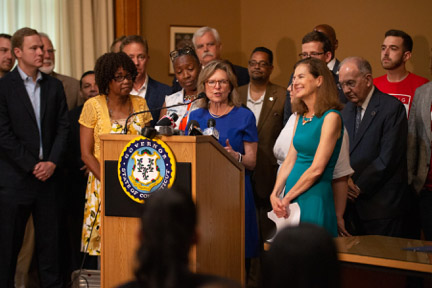Sen. Kushner Joins in Historic Celebration of CT’s Paid Family and Medical Leave Program

HARTFORD – Senator Julie Kushner (D-Danbury) today joined other lawmakers, small business owners, working people and Governor Ned Lamont at a bill-signing ceremony in the State Capitol to celebrate Connecticut’s new paid family and medical leave program.
As Senate Chair of the Labor Committee, Sen. Kushner played a pivotal role in creating and passing the Democrats’ top public policy priority for 2019. When the paid leave program begins on January 1, 2022, Connecticut employees will gain access to the necessary benefits that will allow them to take time off work to care for their own health, a newborn child, or a sick family member. The legislation is Public Act 19-25, “An Act Concerning Paid Family and Medical Leave.”
“I’ve represented working families for more than forty years – I truly understand what a difference this program will make in so many lives,” Sen. Kushner said. “When I campaigned, I talked to people in my district about paid family leave – at the supermarket, at the dry cleaner, at the coffee shop. Two things amazed me: everyone knew about paid leave and supported it, and everyone had their own, personal story about how they could have used a paid leave program. It didn’t matter which party the person identified with — Democrats, Republicans, or unaffiliated voters, the overwhelming majority understood the problem in a very personal way, and were excited about the bill. We have done a great thing in Connecticut by passing one of the very best paid family and medical leave programs in the country. It will strengthen our state’s economy and provide income at a time when people need it most. I couldn’t be prouder to have worked to pass this vital piece of legislation.”
While most other modern countries across the world have some type of paid family and medical leave program, the United States does not. Only 13 percent of private sector workers in America have access to paid family leave, and 25 percent of mothers return to work within two weeks of giving birth. Connecticut joins California, the District of Columbia, Massachusetts, New Jersey, New York, Rhode Island, and Washington as states with paid family and medical leave programs.
Karlene Whonder, a personal care attendant who advocated for the paid family leave bill, bill, told a personal story of her husband’s cancer and how he had to return to work before he was fully healed in order to keep income flowing into their household. “Today we are celebrating a law that will give working people access to paid family and medical leave to be able to fully recuperate. Working people like me will have the freedom to not worry about where our next meal will come from, or stress about how the bills are paid while we focus on healing ourselves or assisting our family members in need,” she said.
Several small business owners also joined Sen. Kushner at the bill-signing event.
“As a small business owner I am so proud that paid family and medical leave is a reality in Connecticut. This program creates real choices for both workers and employers, which is a beautiful thing,” said Rory Gale, owner of Hartford Prints! In downtown Hartford. “We work every day at Hartford Prints! to make Connecticut a more desirable place to live for all our residents. We stand with Governor Lamont and our elected officials today because making Connecticut better means taking care of our working families. We’re a small state with a big heart!”
“As the owner of a small business in Colchester, my employees are the foundation of my business,” said Todd Szoka, owner of Sunshine Cycle & Run in Colchester. “ That’s why I support paid family and medical leave – a critical safety net that supports workers during times of financial insecurity and stress when their last concern should be missing a paycheck. I’m proud to live and own a business in Connecticut, a state that has finally taken the necessary steps to make comprehensive paid family and medical leave a reality for all workers and business owners like myself.”
Details of Connecticut’s Family and Medical Leave Act:
Length of Paid Leave
Connecticut employees will be eligible for up to 12 weeks of paid family and medical leave. As under the longstanding state and federal unpaid family and medical leave acts, employees will need their doctor to certify that they require family or medical leave. If an employee experiences a pregnancy-related serious health condition that results in incapacity then the employee would be eligible for up to 14 weeks.
State programs in Massachusetts and Washington state provide up to 12 weeks of paid family leave; New York and New Jersey will soon provide up to 12 weeks as well. Washington state also provides an additional two weeks for serious pregnancy-related health conditions. California, Rhode Island, New Jersey, New York, Hawaii, and Massachusetts provide up to at least 20 weeks of paid medical leave.
Reasons for Paid Leave
Connecticut employees will be able to use paid family and medical leave for five reasons:
- Care for a new child (birth, adoption, foster)
- Care for family member with serious health condition
- Care for own serious health condition
- Qualifying exigency arising out of family member being on active duty
- To serve as an organ or bone marrow donor
New York, Washington state, and Massachusetts allow reasons one through four. Connecticut will be the only state in the country to allow for paid leave due to donating bone marrow or an organ.
Definition of Family Member
Connecticut’s definition of a family member aligns with that of New Jersey and include:
- Child
- Parent
- Spouse
- Domestic partner
- Grandparent
- Grandchild
- Individual related to the employee by blood or affinity whose close association the employee shows to be the equivalent of those family relationships
New Jersey expanded its paid family and medical leave program to include chosen family members this year.
Benefit Amount
Beginning January 1, 2022, the weekly benefit for Connecticut employees will be 95 percent of 40 times the minimum wage and 60 percent on earnings above the minimum wage. The maximum weekly benefit cannot exceed 60 times the minimum wage, which is the equivalent of $780 on a $13 minimum wage, $840 on a $14 minimum wage, and $900 on a $15 minimum wage.
Connecticut’s benefits align similarly with other states. The District of Columbia and Washington state provide workers with up to 90 percent of their wages. The maximum weekly benefit in California is $1,252; $1,000 in the District of Columbia; and $850 in Massachusetts.
Employees Covered
In Connecticut, paid leave will apply to private sector employers with one or more employees. Self-employed employees and sole-proprietors have the ability to opt-in to the program. In addition, non-union state and local government employees are covered. Unionized public workers will have the ability to collectively bargain and become covered.
Similarly, all private sector employers are covered in state paid leave programs in California, the District of Columbia, Rhode Island, Massachusetts, and Washington state.
Provisions in the state’s longstanding family and medical leave act that protect the jobs of employees who require leave will be extended to apply to small employers, provided employees have worked for an employer for at least three months. New York and Massachusetts also expanded those protections.
Program Funding
In Connecticut, both personal disability leave and family care leave will be funded by the employee only. The withholding rate is 0.5 (one-half of one) percent on earnings up to the Social Security wage base.
Share this page:
